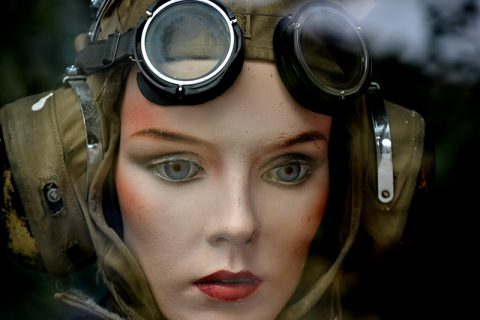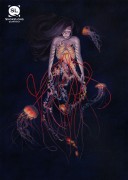How did the idea for “The Abaya” come about?
It started with a real person I saw—a woman, slouched up against a building, wearing pinup blue eyeliner and a hijab. She was smoking a cigarette and looked so angry. I was struck by the incongruity of her cover-up and rawness—she was hidden and naked at the same time.
The image stayed with me and recast itself as Albertine. In the first sketch of the piece she’s viewed through a first-person plural narrator, a chorus of junior high school girls who hate her—though I wasn’t quite sure why at the time. Later, when coming back to the story, the singular narrator emerged, and with it her envy of Albertine’s ability to hide. That’s when I had the heart of my piece—that rebellion against being seen, of wanting to stay a child a little while longer.
I was struck in this story by the protagonist’s struggle between her need to cover up her own body and for Albertine’s body to be seen, and her hesitation of following through with the theft of Albertine’s abaya. There is a beautiful, aching moment in the end where the protagonist briefly considers abandoning her plan. This decision is so human and complicated—sabotaging another person to gain a piece of your own humanity back. Can you discuss the process of writing this moment, how you decided she’d keep the abaya?
Thank you, Joe. I don’t think I decided it methodically. In that moment I saw Albertine through the narrator’s eyes. She realizes they are the same—bruised, vulnerable—and the abaya takes on different meaning. It no longer symbolizes protection, but the shame that makes both girls want to hide. On one hand, the narrator is letting Albertine run out naked into the gym, but on another level she imagines something else—that she is setting them both free.
To be honest, the nuances of all that are something I probably realized in retrospect after writing the piece, and were definitely not what I had in mind before. In my work as a journalist, I usually have some kind of outline, or at least an ending that I’m writing towards. In my fiction it’s very different. If I know the ending, or even the middle, I no longer feel compelled to write the story—it already feels done, in a way. I write to be surprised.
Describe your relationship with flash fiction. What does flash fiction offer that other forms necessarily don’t?
Great flash is like wandering into a van Gogh painting. There are sharp, electric details, that sense of innovation. I was shocked the first time I saw The Starry Night—I was expecting a larger canvas—but the painting itself was powerful, arresting. It’s the same with potent flash—though the word count is small, the emotional impact, the resonance, are great. And because every word is precious, all the frills and garnishes have to be cut—all the stuff that you probably didn’t need, anyway. Unlike other forms, you have what really matters.
What elements or characteristics would the ideal story have? Is there already an example of a story you think is ideal—if so, what story?
It depends. Sometimes it’s a character that pulls you in, like in Aubrey Hirsch’s “Amelia,” or a vivid, unusual premise, like in Michelle Elvy’s “Antarctica,” or a spellbinding voice, like in basically anything by Leesa Cross-Smith or Lindsay Hunter. Above all, it’s that resonance—how any of these elements, or a combination—evoke something reverberating and universal.



 The core workshop of SmokeLong Fitness is all in writing, so you can take part from anywhere at anytime. We are excited about creating a supportive, consistent and structured environment for flash writers to work on their craft in a community. We are thrilled and proud to say that our workshop participants have won, placed, or been listed in every major flash competition. Community works.
The core workshop of SmokeLong Fitness is all in writing, so you can take part from anywhere at anytime. We are excited about creating a supportive, consistent and structured environment for flash writers to work on their craft in a community. We are thrilled and proud to say that our workshop participants have won, placed, or been listed in every major flash competition. Community works.